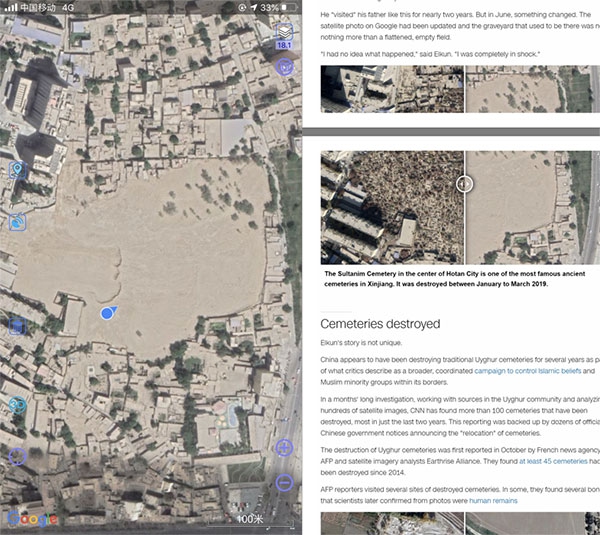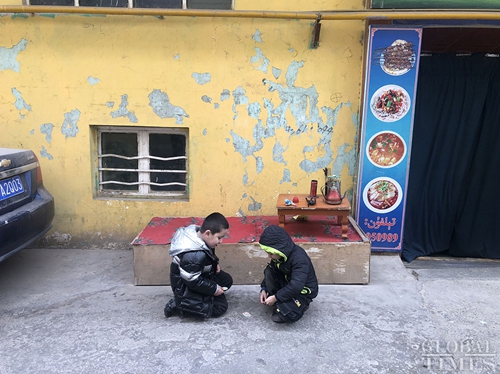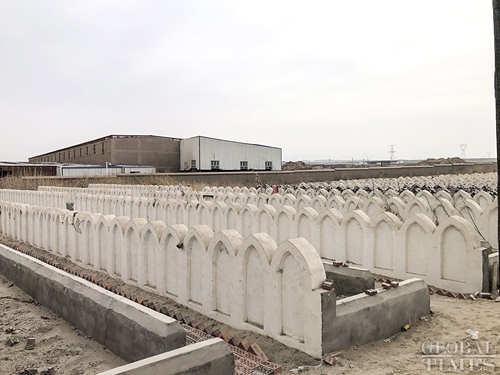Xinjiang residents debunk CNN report of 'cemetery demolition'
The CNN report about "government destroying Uygur cemetery" was apparently biased and partial, the Global Times found, after visiting the "cemetery" mentioned by the CNN.
CNN reported last Thursday that "more than 100 Uygur graveyards were demolished by Chinese authorities," showing satellite images of the Sultanim "cemetery" and jumping to the conclusion that China has been destroying traditional Uygur cemeteries as part of a "campaign to control Islamic beliefs and Muslim minority groups within its border."

Global Times reporters on Monday visits the Sultanim “cemetery” mentioned in a CNN report. It was less than 10 meters away from residential houses. Photo: Liu Xin/GT
The Global Times reporters on Monday visited the Sultanim "cemetery" in Hotan, Northwest China's Xinjiang Uygur Autonomous Region, and interviewed local residents and officials to reveal the true picture. The "cemetery" was located next to residential areas in downtown Hotan and was a source of complaint for local residents.
Some Uygur residents living in the residential area confirmed to the Global Times that some people were buried in the "cemetery" many decades ago and many of the graves were placed in disorder. There was no grave watcher.
Many children of different ethnic groups play around the residential area. Residents living close to the "cemetery" confirmed with the Global Times that they would not allow their children to get close to the place out of concerns for safety and sanitation.

Children play around the residential area. Their parents do not want them to go near the cemetery. Photo: Fan Lingzhi/GT
An official from Hotan local government, who preferred to be called Maizi, told the Global Times that many residents complained to the government about these graves.
The Global Times reporters also found the place where these graves were relocated - a public cemetery in Buzhage county. The facility of the cemetery is still a work in progress and it is about 10 to 15 minutes of driving from the downtown area.
Maizi said that relevant departments made a public notice to help trace family members of innominate graves in Sultanim cemetery. And after two months, they relocated these innominate graves to the new place. The tracing work is ongoing.

Graves from the Sultanim “cemetery” have been relocated to a public cemetery, a place 10 to 15 minutes drive from downtown Hotan. Photo: Fan Lingzhi/GT
Reziwangul, 40, who happened to be in a newly built public cemetery to commemorate her mother who passed away a dozens days ago, told the Global Times that she relocated her father's grave to the new place 10 months ago. Her parents' graves are close to each other now.
Reziwangul confirmed to the Global Times that her local government helped her family to relocate her father's grave for free and in accordance with their traditional rituals.
Tursuniyazi Ashim, 53, an official from Hotan civil affairs bureau, told the Global Times that at least 400 mu (more than 266,666 square meters) of land have been designated as new public cemeteries for ethnic groups in Hotan to meet residents' demands.
Xinjiang Uygur Autonomous Region fully respects the rights of ethnic groups and has taken a series of measures, including allocating specific areas for public cemeteries, to protect their rights, a regional spokesperson told the Global Times in an exclusive interview on Friday.